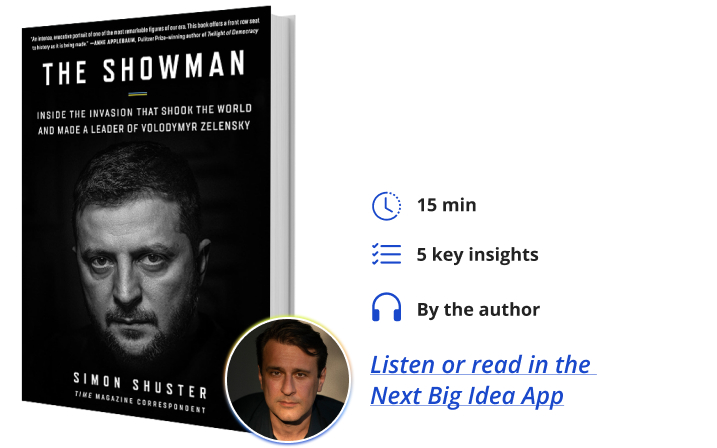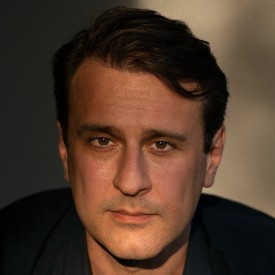Simon Shuster is a senior correspondent for Time magazine, reporting about Russia and Ukraine for the last 17 years.
Below, Simon shares five key insights from his new book, The Showman: Inside the Invasion That Shook the World and Made a Leader of Volodymyr Zelensky. Listen to the audio version—read by Simon himself—in the Next Big Idea App.

1. To survive, be ready to change.
One of Zelensky’s gifts really showed in the opening hours of the invasion. When we talked about that moment, Zelensky remembered giving himself a pep talk as though he were about to go on stage. “They’re watching,” he told himself. “You need to act the way a head of state must act.” At that point, his experience as a statesman and a politician added up to less than three years. But Zelensky was adaptable. He was trained not to lose his nerve under the glare of a massive audience. And he realized at that moment that his audience was much of the world, all of Ukraine, everyone he knew or was ever likely to meet.
He began to play the role that he felt was expected of him. Many other leaders throughout history, leaders with much more experience than Zelensky, have run away when faced with similar attacks. They were not ready to change so suddenly from kings and presidents to wartime commanders. But Zelensky switched into this role with no apparent hesitation. He took off his suit, put on a green t-shirt, and began to act the way a head of state must act.
2. Courage is contagious.
It spread through the ranks of the government and society as soon as people realized their president had stuck around. His mere presence inside the presidential headquarters showed everyone that Ukraine stands, which profoundly affected the country’s defenses.
“His mere presence inside the presidential headquarters showed everyone that Ukraine stands.”
He set an example. He showed up at work and refused to leave. For everyone beneath Zelensky in the hierarchy of the state, that made it a lot harder to pack a bag and get out of town. Some officials still defected. But for the most part, they lined up behind Zelensky and followed his lead. Instead of running for their lives, many Ukrainians picked up whatever weapons they could find and went to defend their towns and cities.
3. Fear is also contagious.
It can protect us, and it can also make us run away. That’s what the Russians were counting on at the start of their invasion. They had sent advanced teams of commandoes into Ukraine with one goal: to spread panic. At one point, while the bulk of Russia’s forces were still far from the capital, gunmen opened fire on the Ukrainian Defense Ministry headquarters, shattering the glass and sending officers ducking for cover.
The Russians were not trying to seize the building. They didn’t have the forces in place to do that. Their aim, as the defense minister explained it to me, was to scare the Ukrainians into running away. “They were testing our nerves,” he told me.
In many places, it worked. The fear that Russia was unstoppable, that its victory was inevitable, made a lot of officials run away when the invasion started. Russia did not need a lot of firepower to achieve that. A few groups of snipers and saboteurs were enough to cause widespread panic in Kyiv. They created the impression that the enemy was already in the heart of the capital, and at that point, the fear spread very fast.
4. Never try to lead alone.
Zelensky didn’t, and in the early days and weeks of the invasion, his trust in others helps explain the way Ukrainians held out. Even though Zelensky was at the top of the military hierarchy, formally speaking, the Supreme Commander in Chief of the armed forces, he did not act that way. He let the generals do the fighting, and he did not second-guess them or overrule their decisions, at least not at first.
When he spoke to his generals in those first days, he would ask them: What do you need? How can we support you? That showed humility. But it was also clever. It gave the military leaders the confidence to lead on the battlefield and respond quickly to events, knowing that the President would back them up. That made their forces a lot more agile and a lot more effective.
“Because of Vladimir Putin’s autocratic style of leadership, his military quickly lost its balance.”
This stood in stark contrast with the Russians. Because of Vladimir Putin’s autocratic style of leadership, his military quickly lost its balance. The Russian commanders on the ground kept waiting for orders from the top. No one trusted the rank below them, and no one dared to question the rank above. That inflexibility contributed to Russia’s failure to win the war in its opening phase.
5. Your screen is a battleground.
Very early in the invasion, President Zelensky understood that most people around the world would experience the war the way they experience so many things in life: through their screens. Even some of Zelensky’s closest aides, the ones who lived with him in a nuclear bunker during the first months of the invasion, experienced the war for the most part through their screens as well, through posts and videos on social media, which often arrived much faster than the military could brief them on what was happening outside the bunker.
While Kyiv was under siege in the spring of 2022, Zelensky had an insight that I think contributed a lot to his success as a leader. He knew from the start that winning the war would require him to keep the free world on his side—not only its leaders and politicians but the voters who elected them. He needed to win their help, their sympathy, their weapons, and their financial aid. As a showman, Zelensky knew that he needed to keep them engaged, to grab and hold their attention on the picture of the war he wanted them to see. His experience on television gave him the skills to do that job better than any Russian propagandist. He knew the power of persuasion and the power of social media, and he knew how to use it.
When we talked about his strategy during the war, it amazed me how often he used the language of television and entertainment to describe it. At one point, he told me, “People see this war on Instagram; when they get sick of it, they will scroll away.” And if the world scrolled away, if the world stopped paying attention, Zelensky knew they would soon stop supporting Ukraine. Without support, Ukraine would lose the war. So Zelensky pursued this as his most important mission: keeping the world engaged, not letting them turn away.
To listen to the audio version read by author Simon Shuster, download the Next Big Idea App today:
































